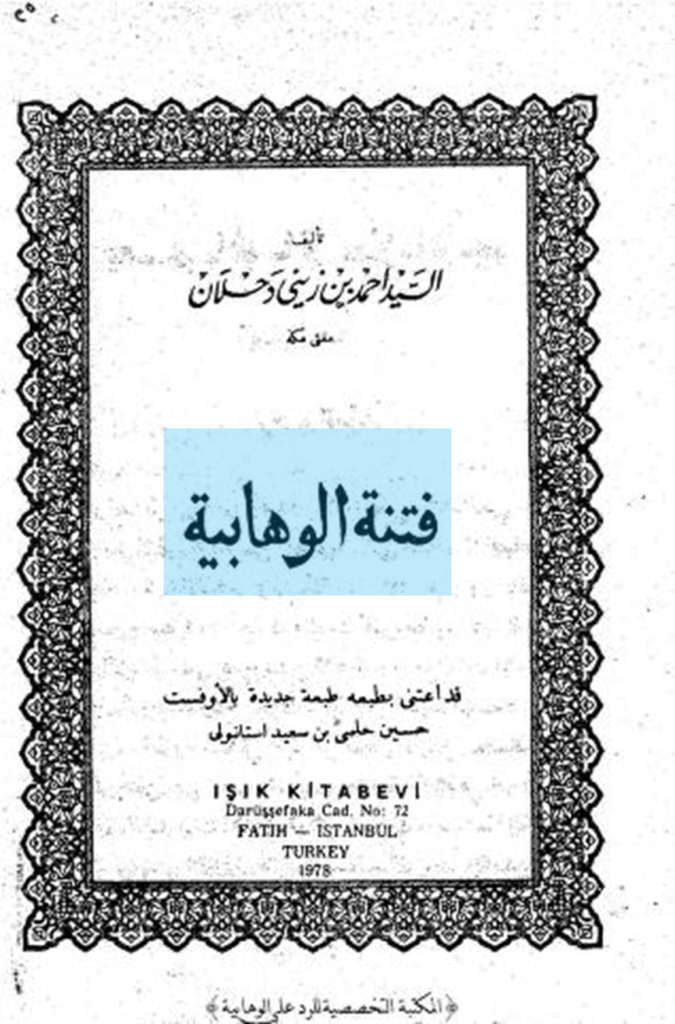Validity According to Arabic Language
One would find many Wahhabis offended by being called “Wahhabis”, saying that it is sinful to use the term because it is derived from Allah’s Name: “Al-Wahhab (The One Who gives abundantly.)”.
They say: “Using Allah’s Name for deviant people is belittling and forbidden!”
Yet more proof of their ignorance! Had they known some of the basics of the Arabic language, they would not argue this point, but this is a fallacy strong enough to at least make someone sympathetic for the Wahhabiyy, so it must be addressed:
Answer: In the books of “sarf (Arabic conjugation/morphology)”, which is the knowledge of the structures of the words, there is the topic of how to attribute something to something else called “nasab”. Its most common rule is suffixing a doubled “ya’” to the word, and that is what is transliterated throughout this book as “–iyy”! For example, if one were a follower of Imam Malik, he would be called a “Malikiyy”. However, that doubled “ya’” is not the only change that may happen to a word.
Simply, if you want to do “nasab” for the name: “Muhammad Ibn ˆAbdi-l-Wahhab”, then the correct and blameless rule is to take it from the end of the name! That is why anyone who understands Arabic properly understands that when we say, “Wahhabiyy”, we are not attributing those people to “Al-Wahhab” – Who is Allah the Exalted; we are attributing them to Muhammad Ibn ˆAbdi-l-Wahhab. That is just like the “nasab” for “ˆAbdu-l-‘Ash-hal” is “Ash-haliyy”, and for “ˆAbdu-l-Qays” is “Qaysiyy”, and a follower of Shaykh ˆAbdu-l-Qadir is a “Qadiriyy”, etc. Therefore, a follower of Muhammad Ibn ^Abdi-l-Wahhab is correctly called a Wahhabiyy, and Allah knows best!
Imam Ibn Malik
Imam Ibn Malik gave the rules for attributing to a compound name in his ‘Alfiyyah (Millennial Poem) [Page 55]:
وَانْسُبْ لِصَدْرِ جُمْلَةٍ وَصَدْرِ مَا رُكّبَ مَزْجًا وَلِثَانٍ تَمَّمَا
870. Make “nasab (attribution)” by using the first segment (of a name in the form) of a sentence, and the first segment of ۞۞۞ What (name) is composed by fusion; And by using the second segment that completes
إِضَافَةً مَبْدُوْءَةً بِابْنٍ أَوَ ابْ أَوْ مَا لَهُ التَّعْرِيْفُ بِالثَّانِيْ وَجَبْ
871. A genitive construction started with “Ibn (Son of)” or “Ab (Father of)”; ۞۞۞ Or that which the definiteness (of its first segment) is mandated by its second segment.
فِيْمَا سِوَى هَذَا انْسُبَنْ لِلْأَوَّلِ مَا لَمْ يُخَفْ لَبْسٌ كَعَبْدِ الْأَشْهَلِ
872. Concerning what is other than this, make “nasab” by using the first (segment), ۞۞۞ as long as there is no fear of confusion, like (the case of) “^Abdu-l-‘Ash-hal”.
https://archive.org/details/489798778/page/n59/mode/2up
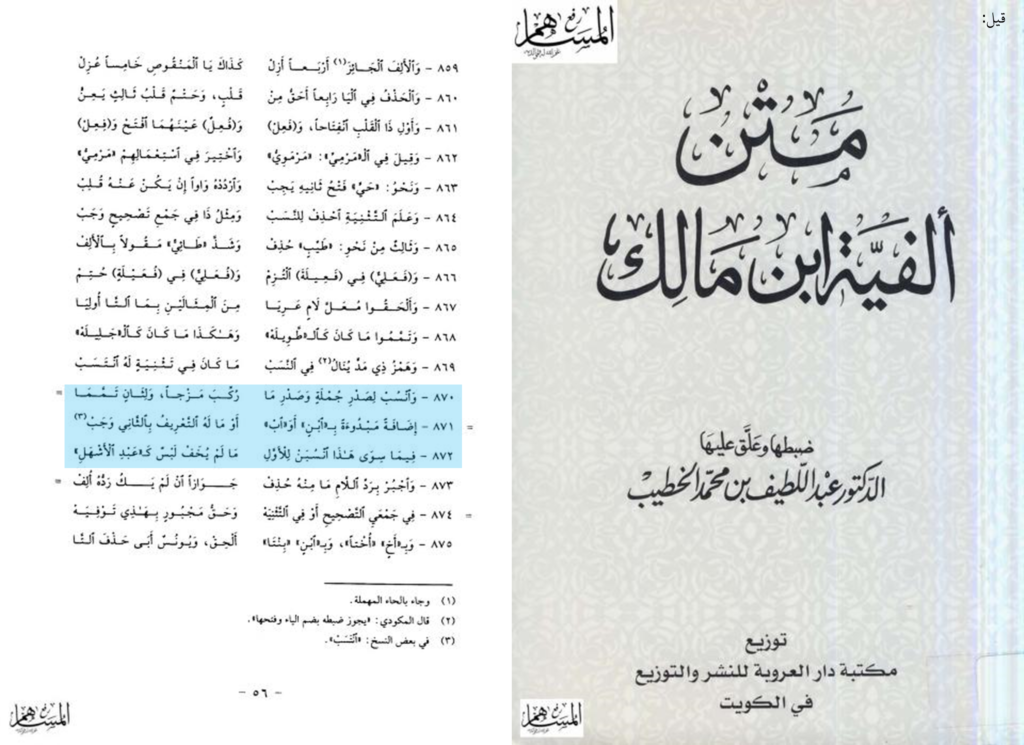
Further Details
- A compound name (tarkīb) in the form of a sentence (isnādiyy) is like someone named “[تَأَبَّطَ شَرّا] (Ta‘abbața Sharrā)”; his name means: “He tucked evil under his armpit”. Nasab (attribution) in this case goes to the first part of the name: “[تأبطيّ] Ta‘abbațiyy”.
- A compound name (tarkīb) formed by fusion (mazjiyy[1]) is like “[حضرموت] Ħađramawt”. Nasab (attribution) in this case also goes to the first part of the name: “[حضرمي] Ħađramiyy”.
- A name in the form of a genitive construction (tarkīb ‘iđāfiyy) is like
“[ابن الزبير] Ibn Az-Zubayr” and “[أبو بكر] ‘Abu Bakr” and “[غلام زيد] Ghulam Zayd”. Nasab (attribution) in this case goes to the second part of the name: “[زبيري] Zubayriyy”, “[بكري] Bakriyy”, “[زيدي] Zaydiyy”.
If that genitive construction is not one of the above, then there are two cases: either there is no ambiguity in putting the “nasab” in the first segment or there is:
- If not, then the nasab is given to the first segment, like in the case of [امرئ القيس] Imri’ Al-Qays. You say [امرئي] Imri’iyy (or Mara’iyy).
- If so, then it is given to the second segment, like [عبد الأشهل] ^Abdul-‘Ash-hal and
[عبد القيس] ^Abdu Qays. Using the first segment for both is confusing, so you use the second segment and say [أشهلي] Ash-haliyy and [قيسي] and Qaysiyy.
This is the case for nasab (attributing) to [محمد بن عبد الوهاب] “Muhammad Ibn ^Abdi-l-Wahhab”. You correctly say: [وهابيّ] “Wahhabiyy”, like a follower of [عبد القادر] ^Abdu-l-Qadir is called [قادريّ] “Qadiriyy”. The author of Shadha-l-^Arf said: Like they say about [عبد مناف] ^Abdu Manaf: [منافيّ] Manafiyy. Allah Knows Best!
Besides stealing ‘Ahlu-s-Sunnah’s name, they also fraudulently call themselves “Ahlu-l-Haqq (the People of the Truth)” and “Ahlu-l-Hadith (the People of [the science of] Hadith)”[1]. They have also been called “La Madhhabiyyah (unsubscribed to any school of fiqh)”, and “Ghayru Muqallidin (anti-followers). They explain this name to mean that they do not merely imitate the scholars, rather they imitate the Prophet ﷺ through the hadiths. But in fact, it means that they do not follow qualified scholarship.
Truly, they are “Ahlu-l-Kibr (the People of Arrogance)”, “Ahlu-d-Dalalah (the People of Misguidance)”, “Ahlu-l-Bidˆah (the People of Innovation)”, “Mushabbihah (the Likeners)”, “Mujassimah (body worshipers)”, “Jihawiyyah (Those who believe God is in a direction)”, “Sawtiyyah (Those who believe God has a voice)”, “Hashwiyyah[2] (Ramblers)”, “Mubtadiˆah (Heretics)”, and “kuffar (blasphemers; disbelievers[3])”, among other titles, like “the Najdis” because they first emerged from the land of Najd, and mushriks (pagans), because they associate creations with God.
It is easy for an ignorant person to commit kufr (blasphemy) because of them[4], and many have fallen into their snare, because besides their kufr, they talk and dress like Muslims. However, if lent a listening ear, they surely will throw an unfortunate soul into the black flames of Jahannam. This does not include anyone who does not believe the blasphemous belief of the Wahhabis but may call himself a Salafiyy. Let whoever meets one of these deviant people not be intimidated, nor should he underestimate every one of them – until he masters this book! Some Wahhabis study and memorize, ready to bombard their opponent, but this book should give you the answer for every trick they have up their sleeves.
This concludes the introduction differentiating between ‘Ahlu-s-Sunnah and the Wahhabis. Now we shall embark on the main topic of the book: establishing the correct belief and refuting the Wahhabiyy conviction.
[1] When calling themselves “‘Ahlu–l–Hadith”, they truly mean that they (unrightfully) make ijtihad from the hadiths– bypassing what the mujtahids said. They may also mean that they are the people who take the hadiths literally and do not assign alternative meanings to them.
[2] It may also be pronounced as “hashawiyyah”.
[3] Whoever believes that Allah is a body is not a Muslim. However, just because someone calls himself a “Salafiyy” does not necessitate that he believes that Allah is a body. It is the basic belief of Wahhabis that Allah is a body in the sky, which is disbelief, so in general they are disbelievers, but the rule pertaining to individuals who are affiliated with deviant factions is that it is not permissible to assume that they, as individuals, are disbelievers. As long as they do not show any disbelief outwardly, they are deemed Muslims.
[4] This is because they will inject the ignorant person with their beliefs of anthropomorphism. He would not know any better, and thus would say and believe that Allah is a special, physical being existing in a place and a direction, having limbs and motion and stillness and other created characteristics. He was an easy target for them because he was ignorant.
Ibn Baz
The Wahhabiyy Imam Ibn Baz said as documented on his official site:
الوهابية هم أتباع الشيخ الإمام: محمد بن عبد الوهاب
which means: The Wahhabiyys, they are the followers of Shaykh Imam Muhammad ibn ^Abdil-Wahhab. [Audio of Ibn Baz: https://binbaz.org.sa/fatwas/10949/التعريف-بالوهابية]
Ibn Uthaymin
The Wahhabiyy Imam Ibn ^Uthaymin in his book, which he called Fatawa Al-^Aqidah utilises the term Al-Wahhabiyyah and falsely praises them on Page 435.
ولا يكون العمل صالحا إلا بأمرين : الإخلاص لله ، والموافقة لشريعته التي جاء بها رسوله ﷺ. وأما ما ذكره من مجادلة الطالب له، وقول بعضهم إنه رجل وهابي وأن الوهابية لا يقرون المدائح النبوية وما إلى ذلك ، فإننا نخبره وغيره بأن الوهابية ولله الحمد كانوا من أشد الناس تمسكا بكتاب الله وسنة رسوله أشد الناس تعظيما لرسول الله ﷺ واتباعاً لسنته ويدلك على هذا أنهم كانوا حريصين دائماً على اتباع سنة الرسول ﷺ : والتقيد بها ، وإنكار ما خالفها من عقيدة أو عمل قولي أو فعلي
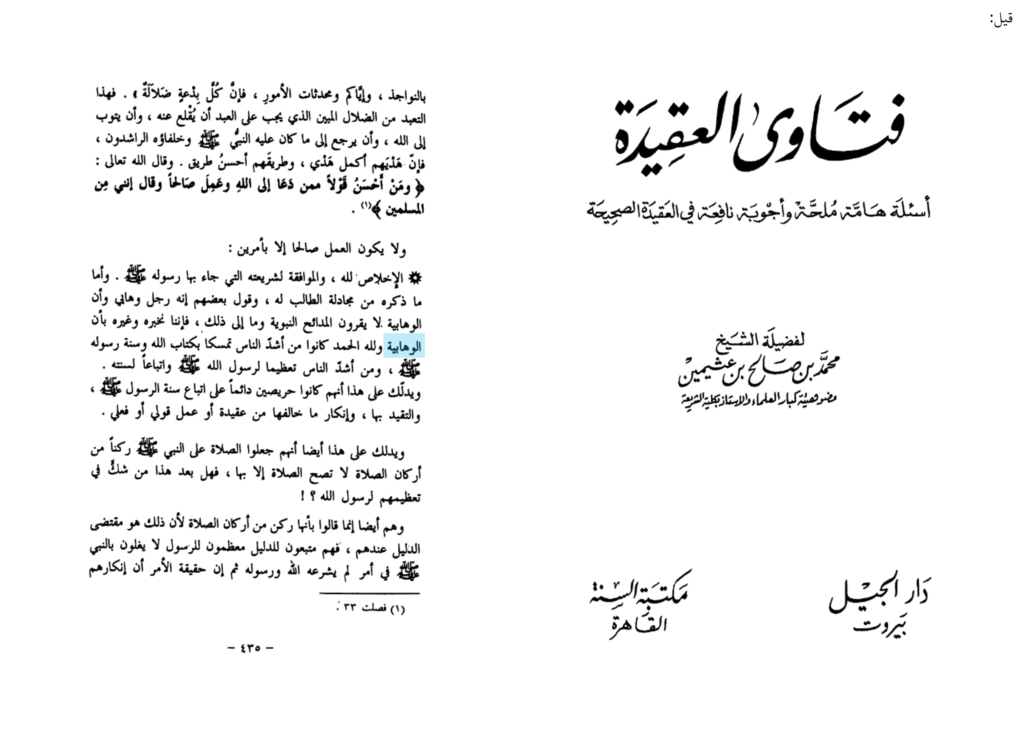
Shaykh Sulayman ibn ^Abdil-Wahhab
Ash-Shaykh Sulayman ibn ^Abdil-Wahhab, the good scholar, and brother of Muhammad ibn ^Abdil-Wahhab An-Najdiyy, wrote books refuting his own brother and the followers of his brother. Among them is As–Sawaˆiq Al-‘Ilahiyyah Fi-r-Raddi ˆAla-l-Wahhabiyyah (The Devine Bolts in Refuting the Wahhabis), and it has been printed.
Copy 1: https://archive.org/details/SAWAIQ_ILAHIA/mode/2up
Copy 2: https://archive.org/details/AL-Tajdeedi.library/mode/2up
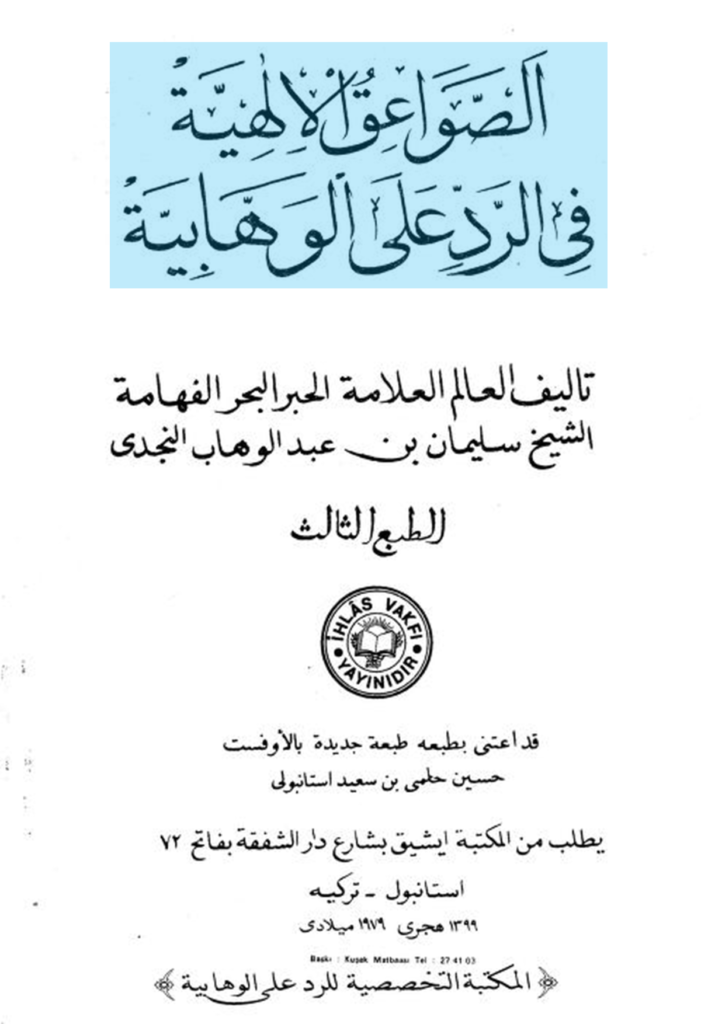
Ibn ^Abidin Al-Hanafiyy
Ibn ^Abidin Al-Hanafiyy in his book Radd Al-Muhtar (Volume 6. Page 413) refers to the followers of (Muhammad ibn) ^Abdil-Wahhab as the Khawarijj.[https://archive.org/details/waq61487/06_61492/page/n412/mode/2up]:
مَطْلَبٌ فِي أتْباعِ (مُحَمَّد ابْن) عَبْدِ الوَهّابِ الخَوارِجِ فِي زَمانِنَا
(قَوْلُهُ: ويُكَفِّرُونَ أصْحابَ نَبِيِّنا ﷺ) عَلِمْتَ أنَّ هَذا غَيْرُ شَرْطٍ فِي مُسَمّى الخَوارِجِ، بَلْ هُوَ بَيانٌ لِمَن خَرَجُوا عَلى سَيِّدِنا عَلِيٍّ – رَضِيَ اللَّهُ تَعالى عَنْهُ -، وإلّا فَيَكْفِي فِيهِمْ اعْتِقادُهُمْ كُفْرَ مَن خَرَجُوا عَلَيْهِ، كَما وقَعَ فِي زَمانِنا فِي أتْباعِ (مُحَمَّد ابْن) عَبْدِ الوَهّابِ الَّذِينَ خَرَجُوا مِن نَجْدٍ وتَغَلَّبُوا عَلى الحَرَمَيْنِ وكانُوا يَنْتَحِلُونَ مَذْهَبَ الحَنابِلَةِ، لَكِنَّهُمْ اعْتَقَدُوا أنَّهُمْ هُمْ المُسْلِمُونَ وأنَّ مَن خالَفَ اعْتِقادَهُمْ مُشْرِكُونَ، واسْتَباحُوا بِذَلِكَ قَتْلَ أهْلِ السُّنَّةِ وقَتْلَ عُلَمائِهِمْ حَتّى كَسَرَ اللَّهُ تَعالى شَوْكَتَهُمْ وخَرَّبَ بِلادَهُمْ وظَفِرَ بِهِمْ عَساكِرُ المُسْلِمِينَ عامَ ثَلاثٍ وثَلاثِينَ ومِائَتَيْنِ وألْفٍ. اهـ.
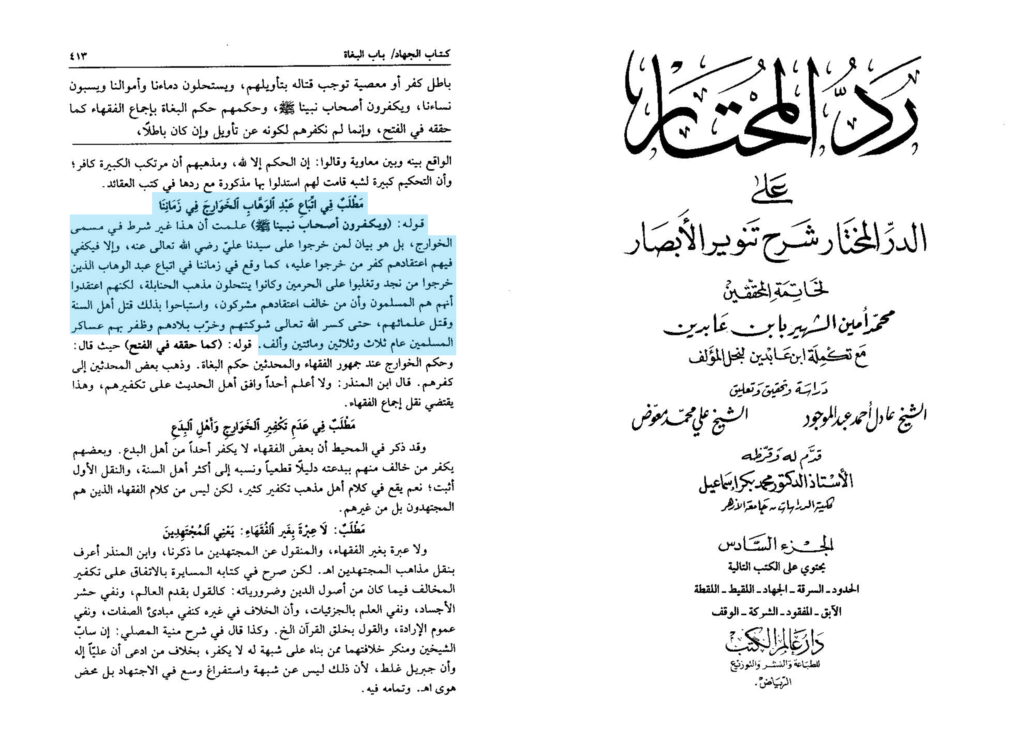
Shaykh Ahmad Zayni Dahlan
Ash-Shaykh Ahmad ibn Zayni Dahlan authored a book called “The Tribulation of the Wahhabiyys (Fitnatul-Wahhabiyyah)”. In this book he exposes the extremism and misguidance of the Wahhabiyy movement. [https://archive.org/details/fitnah-wahabi/mode/2up]
